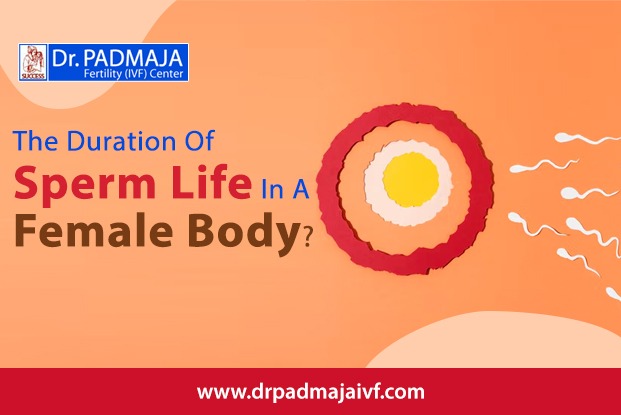When trying to conceive or understand your fertility better, one of the most common questions people have is: How long does sperm live inside a woman’s body? Both couples attempting to conceive and those attempting to naturally avoid pregnancy need to know the answer to this question.
Understanding sperm lifespan, how it behaves inside the female reproductive system, and how timing affects conception can greatly improve your chances of success. Here’s everything you need to know, explained simply and clearly.
How much time may sperm spend within a female’s body?
Sperm can survive in a woman’s body for up to five days under the right circumstances. However, this is mostly dependent on the sperm’s overall health and the presence of cervical mucus.
The cervix secretes a unique type of mucus during ovulation that is clear, slick, and elastic, creating the ideal conditions for sperm to swim and thrive. This cervical mucus protects sperm from the acidic environment of the vagina and helps guide it toward the egg in the fallopian tube.
Outside of the fertile window, the vagina and cervix become more hostile to sperm, reducing their survival time to just a few hours.
The Fertile Window: Why Timing Matters
Since sperm can survive up to 5 days in the female body, having unprotected sex a few days before ovulation can still result in pregnancy. This is why understanding your fertile window—the days leading up to and including ovulation—is crucial when trying to conceive.
The egg itself, however, only lives for 12 to 24 hours after being released. That means the sperm needs to already be present or reach the egg shortly after ovulation for fertilization to happen.
If you’re unsure when you ovulate, many women track their cycles using apps, ovulation kits, or by monitoring changes in their cervical mucus.
Factors That Affect Sperm Lifespan Inside the Female Body
How long sperm survive in the female reproductive tract depends on a number of factors:
Cervical mucus quality: Fertile-quality mucus increases sperm lifespan.
Vaginal pH levels: Healthy pH levels create a supportive environment for sperm.
Overall sperm health: Sperm have a higher probability of surviving if they are in better health.
Timing of intercourse: Intercourse close to ovulation improves the likelihood of sperm meeting the egg.
For couples facing fertility challenges, getting a professional evaluation is a smart next step. At the DrPadmaja Fertility Center, a team of experienced fertility specialists can help assess both partners and offer guidance on maximizing natural conception chances or exploring assisted reproductive options.
What Takes Place When Sperm Are Not Able to Fertilize an Egg?
Not all sperm reach the egg. In fact, the journey is long and difficult, and most sperm don’t make it past the cervix. Those that do are either used in fertilization or eventually die and are absorbed by the body.
This is a normal part of the reproductive process. In some cases, however, issues like low sperm count, poor motility, or cervical mucus problems can interfere with sperm survival or movement. If pregnancy doesn’t happen after months of trying, it may be time to consult a fertility specialist.
When to Seek Help for Fertility Issues
If you’ve been trying to conceive for a year (or six months if you’re over 35) without success, it might be time to seek help. At the best IVF center in Hyderabad, Dr Padmaja IVF Center, couples receive world-class care, advanced testing, and access to modern fertility treatments tailored to their needs.
Whether it’s timed intercourse guidance, IUI, IVF, or sperm analysis, DrPadmaja Fertility Center provides complete fertility solutions with compassion and expertise.
Why Choose Dr Padmaja IVF Center?
The Dr Padmaja IVF Center has helped countless couples navigate their fertility journey with trust and confidence. Here’s why it’s considered one of the best IVF centers in Hyderabad:
Experienced Team: Led by Dr. Padmaja, a renowned fertility expert, the clinic is backed by a skilled team of specialists and embryologists.
Advanced Technology: Equipped with state-of-the-art lab facilities, the center offers cutting-edge treatments and diagnostics.
Personalized Care: Each couple is given a treatment plan that is specific to their objectives and particular reproductive issues.
High Success Rates: With consistently positive outcomes and hundreds of success stories, the clinic has earned a solid reputation for excellence.
Final Thoughts
Knowing how long sperm lives in a woman’s body is just one piece of the fertility puzzle—but it’s an important one. For couples trying to conceive, understanding timing, ovulation, and the role of cervical mucus can significantly increase the chances of pregnancy.
If you’re looking for guidance or suspect fertility challenges, DrPadmaja Fertility Center offers expert support at every step. Their caring team is here to help you turn hope into reality with the most trusted fertility care in Hyderabad.
Start your journey today with the best IVF center in Hyderabad, and take the first step toward building the family you’ve been dreaming of.
About the Author

This blog is penned by a devoted content specialist passionate about raising awareness around fertility treatments and emotional well- being. With in- depth disquisition on motifs like IVF and fertility, the thing is to give precious perceptivity for couples on their trip to parenthood.
Frequently Asked Questions (FAQs)
- How long can sperm survive inside the female reproductive tract?
Sperm can live for up to 5 days inside a woman’s body if cervical mucus is fertile and provides a protective environment.
- What affects how long sperm can live inside the female body?
Factors include cervical mucus quality, pH levels, ovulation timing, and overall sperm health.
- Can you get pregnant if you have sex a few days before ovulation?
Yes. Since sperm can survive up to 5 days, intercourse before ovulation can still lead to fertilization when the egg is released.
- How long do sperm live in the vagina?
In the acidic environment of the vagina, sperm typically survive only a few hours unless they quickly enter the cervix.
- Do all sperm live for 5 days?
No. While some sperm can live up to 5 days, most die within 1–2 days if conditions aren’t ideal.
- How does cervical mucus help sperm survive?
Fertile cervical mucus (during ovulation) nourishes and protects sperm, increasing their chances of survival and successful fertilization.
- Can sperm live longer inside the uterus or fallopian tubes?
Yes. Once sperm pass through the cervix into the uterus and fallopian tubes, they are more protected and can live longer—up to 5 days.

